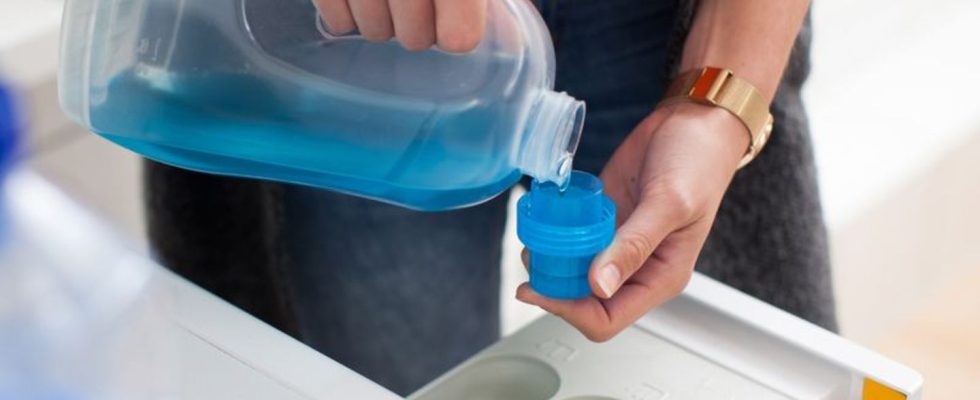The scent of oranges in washing-up liquid, lavender in laundry, vanilla in deodorant – fragrances are now almost everywhere. But they can make you ill – they pose a risk for allergy sufferers and asthmatics.
When Sarah Wieland leaves her apartment, she experiences a kind of gauntlet run: the neighbor’s perfume and cleaning agent residue hang in the air in the stairwell. The smell of fabric softener wafts from the laundry room. On the way, people spread scent from hairspray, creams and detergents. What sounds pleasant for some people is a health risk for Wieland.
The 29-year-old is asthmatic and reacts strongly to fragrances. The result: breathing difficulties, skin rash, low mood and so-called brain fog, which means, among other things, problems concentrating. Room fresheners, incense sticks and candles are also difficult for them. She encounters them in doctor’s surgeries, public toilets, her yoga studio and her child’s day care center.
Wieland, who lives near Aschaffenburg and actually has a different name, is not an isolated case. “One to three affected people contact us every day,” says Silvia Pleschka, fragrance expert at the German Asthma and Allergy Association (DAAB) in Mönchengladbach, in the run-up to World Asthma Day on May 2nd. Some are desperate, especially since they are often met with a lack of understanding. “Many people cannot imagine that something as beautiful as fragrances has health risks,” says Pleschka. In addition, the sense of smell has often gotten so used to it that they themselves no longer notice how strong everything smells. But fragrances are chemicals that pollute the air, says Pleschka. Some could even have an endocrine effect, i.e. influence the hormone balance.
Common allergy trigger
According to studies, fragrances are the second most common trigger of contact allergies after nickel. That is, there is an allergic reaction upon skin contact. But even the mere inhalation can cause symptoms according to those affected. This is often referred to as a fragrance sensitivity or intolerance. In an international study, a third of those questioned said they were sensitive to fragrances. Every second asthmatic reported health problems caused by fragrances. “The number of unreported cases is high,” says chemist Pleschka. Whether synthetic or natural fragrance, makes no difference.
According to studies, the probability of a fragrance allergy increases with age. According to the DAAB, the reason is, among other things, that the fragrances can accumulate in the body, especially synthetic ones. Even those who do not yet have symptoms can already be affected. The Federal Environment Agency found the scent Lysmeral in the urine of all children and adolescents examined. However, more detailed studies on the effect and risk potential of many fragrances are still pending.
treatment difficult
So far, there is neither a standardized diagnosis nor treatment for fragrance allergies and intolerance. Most sufferers try to avoid fragrances as much as possible. “My apartment is now relatively safe,” says Wieland. It took her a long time to find all the hidden scents. For example in dishwasher tabs, packaging and toys. But everything outside the home is difficult for Wieland. According to the DAAB, many places are deliberately scented, such as shops, buses and cinemas, care facilities and clinics. Wieland and her family have broken off trips several times because the stress in the accommodation was too great. “It’s also not possible to buy used things,” says Wieland.
The worst: the contact with other people suffers. The physical consequences lead to strong emotional stress, as Wieland says. Fortunately, she can pursue her work as a computer scientist from her home office. According to a study from Sweden, Australia, Great Britain and the USA, the economic loss from fragrance-related sick days and layoffs in the countries amounts to 146 billion US dollars per year. Other studies support that fragrances in the workplace can be associated with asthma.
“Long search for information and exchange”
Wieland finds support from other people affected, especially on social media. Even a classifieds portal for fragrance-free items was founded. Self-help groups for people with multiple chemical sensitivity (MCS) also deal with fragrance allergies. Fragrance allergy sufferers are also listened to by environmental doctors, for example at the environmental medicine outpatient clinic at the University Hospital in Augsburg. “Most of those affected are looking for information and exchange for a long time,” says Pleschka from the DAAB.
In some other countries, the danger already seems to have penetrated the public consciousness. An Australian researcher found several establishments such as city halls, libraries, churches, restaurants and hospitals, particularly in Canada and the United States, that advise visitors not to use fragrances.
Appeals usually go unheeded
In Germany, too, the topic has repeatedly become a political issue. In 2020, the Greens in the Bundestag called for the scenting of public spaces and means of transport, kindergartens, hospitals and the like to be banned, as well as allergenic scents in toys. The Federal Environment Agency also advocates not scenting public spaces in general. The Bavarian state parliament has already dealt with fragrances. “But nothing happens,” says Pleschka from DAAB.
Avoiding fragrances is difficult even in your own home. Because they do not have to be fully declared on products. Even personal care products that are marketed as “fragrance-free” can contain fragrances, research has found. The Lower Saxony Office for Consumer Protection also found labeling deficiencies in room fragrances. For Sarah Wieland and others affected, the gauntlet will continue for the time being.

